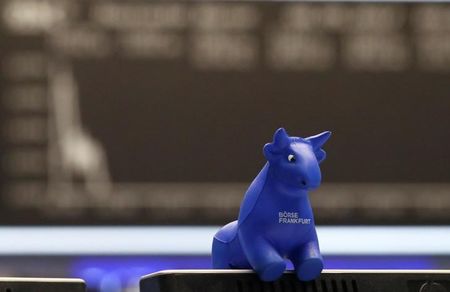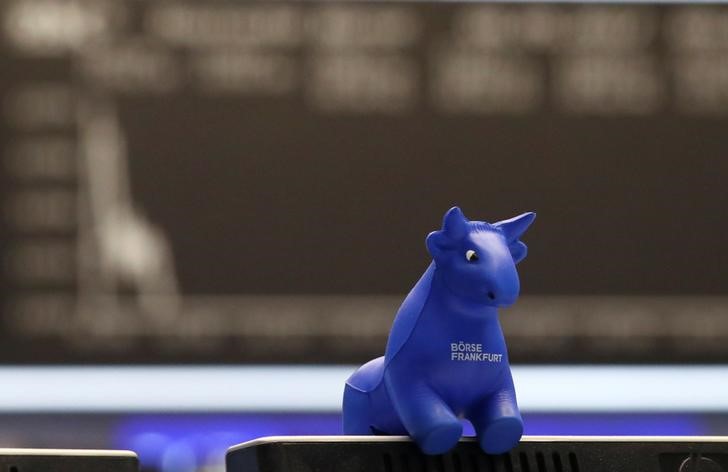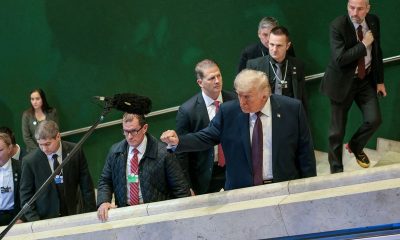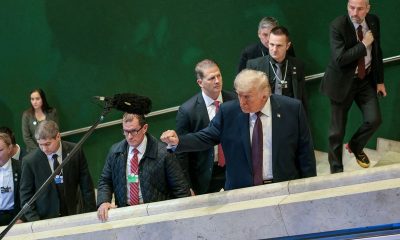Economy
Global stocks muted, Meta to unveil Twitter rival – what’s moving markets


© Reuters.
Investing.com — Global stocks search for direction with Wall Street set to remain closed on Tuesday for the July 4 holiday. Meanwhile, Meta gears up to release a platform to rival Twitter later this week in a bid to attract users unhappy with Elon Musk’s management of the social media site. Elsewhere, China unveils export controls on two key minerals in the latest development of an ongoing war over microchips between Beijing and the West.
1. Global stocks muted amid U.S. holiday, light data calendar
European and Asian stock markets hovered broadly around the flatline on Tuesday as investors were searching for cues in a light data calendar and a U.S. holiday.
At 05:07 ET (09:07 GMT), the in Germany slipped 6 points or 0.04%, France’s rose by 3 points or 0.05%, and the pan-European gained 1 point or 0.23%. In the U.K., the edged up by 8 points or 0.11%.
The muted trading in the region comes after shares in Asia moved in a flat-to-low range, with a string of weak data prints from major economies denting risk appetite. Japanese stocks, in particular, slid from 33-year highs, in a sign that a recent rally in equities in the country may be stalling.
Elsewhere, China’s and posted small increases, while the in South Korea shed 0.35%.
Markets on Wall Street, meanwhile, will be closed today for the Independence Day holiday.
2. Meta’s Twitter rival
Facebook-owner Meta (NASDAQ:) is set to unveil its answer to Twitter later this week, according to a listing in the Apple App Store, piling pressure on Elon Musk’s social media company to retain users who have become disgruntled over the billionaire’s management of the business.
Meta’s new service, Threads, will launch on Thursday. The “text-based conversation” app, which will be directly linked to Meta’s mega-popular photo-sharing platform Instagram, claims that it will be place “where communities come together to discuss everything from the topics you care about today to what’ll be trending tomorrow.”
The release of Threads could prove to be yet another challenge for Twitter. Users have already begun to seek alternatives to the platform in response to controversial decisions taken by Musk, who bought the company for $44 billion in October.
Most recently, Musk announced that will be placed on the number of posts that can be viewed, saying it was necessary in part to “address extreme levels of data scraping.” The decision was widely slammed by users, many of whom pay monthly fees for increased prominence on the site.
3. China curbs exports of semiconductor metals
China has access to exports of two crucial minerals used in the creation of computer chips, in the latest salvo in the war over semiconductors between Beijing and the West.
According to China’s Ministry of Commerce, the minerals gallium and germanium will be subject to unspecified export controls starting next month. The U.S. has said the metals are crucial in the production of microchips, military equipment, and communications.
In a statement, the Chinese ministry said the measure will help protect “national security and interests.”
Meanwhile, the Wall Street Journal reported on Tuesday the U.S. is also preparing to place restrictions on Chinese companies’ access to cloud computing services, including those of Amazon (NASDAQ:) and Microsoft (NASDAQ:).
4. Supply cuts push up oil
Oil prices climbed on Tuesday, as traders weighed increased supply cuts by key exporters Saudi Arabia and Russia against signs of weakening global economic activity.
At 05:10 ET, futures traded 0.70% higher at $70.49 a barrel, while the contract added 0.74% to $75.39 per barrel.
Saudi Arabia announced on Monday it will extend its recently announced 1 million barrels per day cuts to August and potentially beyond, while Russia also said it will trim its oil exports by 500,000 bpd.
However, any gains are likely to be limited with U.S. markets on holiday.
5. RBA keeps interest rates steady
The has decided to its cash rate at an 11-year high of 4.10% on Tuesday, as it attempts to gauge the impact of the 400 basis points of hikes since last May on the broader economy.
But Australia’s central bank flagged that further tightening may still be needed to bring down elevated price growth. rose by 5.6% on an annual basis in May, according to official data, although this was slower than a recent peak of 8.4% in December.
“Inflation is still too high and will remain so for some time yet,” warned RBA governor Philip Lowe in a statement.
The RBA is one of several central banks to embark upon a campaign of aggressive borrowing cost increases recently; the trend that has been a major driver of trading sentiment throughout 2023.
Economy
Russian central bank says it needs months to make sure CPI falling before rate cuts -RBC


© Reuters. Russian Central Bank Governor Elvira Nabiullina attends a news conference in Moscow, Russia June 14, 2019. REUTERS/Shamil Zhumatov/File Photo
MOSCOW (Reuters) – Russia’s central bank will need two to three months to make sure that inflation is steadily declining before taking any decision on interest rate cuts, the bank’s governor Elvira Nabiullina told RBC media on Sunday.
The central bank raised its key interest rate by 100 basis points to 16% earlier in December, hiking for the fifth consecutive meeting in response to stubborn inflation, and suggested that its tightening cycle was nearly over.
Nabiullina said it was not yet clear when exactly the regulator would start cutting rates, however.
“We really need to make sure that inflation is steadily decreasing, that these are not one-off factors that can affect the rate of price growth in a particular month,” she said.
Nabiullina said the bank was taking into account a wide range of indicators but primarily those that “characterize the stability of inflation”.
“This will take two or three months or more – it depends on how much the wide range of indicators that characterize sustainable inflation declines,” she said.
The bank will next convene to set its benchmark rate on Feb. 16.
The governor also said the bank should have started monetary policy tightening earlier than in July, when it embarked on the rate-hiking cycle.
Economy
China identifies second set of projects in $140 billion spending plan


© Reuters. FILE PHOTO: Workers walk past an under-construction area with completed office towers in the background, in Shenzhen’s Qianhai new district, Guangdong province, China August 25, 2023. REUTERS/David Kirton/File Photo
SHANGHAI (Reuters) – China’s top planning body said on Saturday it had identified a second batch of public investment projects, including flood control and disaster relief programmes, under a bond issuance and investment plan announced in October to boost the economy.
With the latest tranche, China has now earmarked more than 800 billion yuan of its 1 trillion yuan ($140 billion) in additional government bond issuance in the fourth quarter, as it focuses on fiscal steps to shore up the flagging economy.
The National Development and Reform Commission (NDRC) said in a statement on Saturday it had identified 9,600 projects with planned investment of more than 560 billion yuan.
China’s economy, the world’s second largest, is struggling to regain its footing post-COVID-19 as policymakers grapple with tepid consumer demand, weak exports, falling foreign investment and a deepening real estate crisis.
The 1 trillion yuan in additional bond issuance will widen China’s 2023 budget deficit ratio to around 3.8 percent from 3 percent, the state-run Xinhua news agency has said.
“Construction of the projects will improve China’s flood control system, emergency response mechanism and disaster relief capabilities, and better protect people’s lives and property, so it is very significant,” the NDRC said.
The agency said it will coordinate with other government bodies to make sure that funds are allocated speedily for investment and that high standards of quality are maintained in project construction.
($1 = 7.1315 renminbi)
Economy
Russian central bank says it needs months to make sure CPI falling before rate cuts -RBC


© Reuters. Russian Central Bank Governor Elvira Nabiullina attends a news conference in Moscow, Russia June 14, 2019. REUTERS/Shamil Zhumatov/File Photo
MOSCOW (Reuters) – Russia’s central bank will need two to three months to make sure that inflation is steadily declining before taking any decision on interest rate cuts, the bank’s governor Elvira Nabiullina told RBC media on Sunday.
The central bank raised its key interest rate by 100 basis points to 16% earlier in December, hiking for the fifth consecutive meeting in response to stubborn inflation, and suggested that its tightening cycle was nearly over.
Nabiullina said it was not yet clear when exactly the regulator would start cutting rates, however.
“We really need to make sure that inflation is steadily decreasing, that these are not one-off factors that can affect the rate of price growth in a particular month,” she said.
Nabiullina said the bank was taking into account a wide range of indicators but primarily those that “characterize the stability of inflation”.
“This will take two or three months or more – it depends on how much the wide range of indicators that characterize sustainable inflation declines,” she said.
The bank will next convene to set its benchmark rate on Feb. 16.
The governor also said the bank should have started monetary policy tightening earlier than in July, when it embarked on the rate-hiking cycle.

 Forex4 years ago
Forex4 years agoForex Today: the dollar is gaining strength amid gloomy sentiment at the start of the Fed’s week

 Forex3 years ago
Forex3 years agoUnbiased review of Pocket Option broker

 Forex3 years ago
Forex3 years agoDollar to pound sterling exchange rate today: Pound plummeted to its lowest since 1985

 Forex3 years ago
Forex3 years agoHow is the Australian dollar doing today?

 Cryptocurrency4 years ago
Cryptocurrency4 years agoWhat happened in the crypto market – current events today

 World3 years ago
World3 years agoWhy are modern video games an art form?

 Commodities3 years ago
Commodities3 years agoCopper continues to fall in price on expectations of lower demand in China

 Economy3 years ago
Economy3 years agoCrude oil tankers double in price due to EU anti-Russian sanctions

























